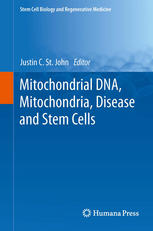

Most ebook files are in PDF format, so you can easily read them using various software such as Foxit Reader or directly on the Google Chrome browser.
Some ebook files are released by publishers in other formats such as .awz, .mobi, .epub, .fb2, etc. You may need to install specific software to read these formats on mobile/PC, such as Calibre.
Please read the tutorial at this link: https://ebookbell.com/faq
We offer FREE conversion to the popular formats you request; however, this may take some time. Therefore, right after payment, please email us, and we will try to provide the service as quickly as possible.
For some exceptional file formats or broken links (if any), please refrain from opening any disputes. Instead, email us first, and we will try to assist within a maximum of 6 hours.
EbookBell Team

4.0
76 reviewsThis volume investigates how the mitochondrial genome is transmitted, segregated, and inherited. It starts by describing mtDNA mutations and deletions and how these impact on the offspring’s well-being. It progresses to discuss how mutations to the mtDNA-nuclear-encoded transcription, replication and translational factors lead to mtDNA-depletion syndromes and how these affect cellular function and lead to the pathology of human mitochondrial disease. It also highlights the importance of the mitochondrial assembly factors and how mutations to these can lead to mitochondrial disease. The reader is then introduced to how mtDNA is transmitted through the oocyte and how stem cells can be used to study mitochondrial biogenesis and mtDNA replication and transcription in undifferentiated pluripotent and differentiating cells and how mitochondria adapt during this process. It then discusses how diseases like cancer are initiated and regulated by mutations to mitochondrial DNA and dysfunctional mitochondria. Finally, it draws on assisted reproductive technologies to discuss how some of these approaches might be adapted to prevent the transmission of mutant and deleted mtDNA from one generation to the next.